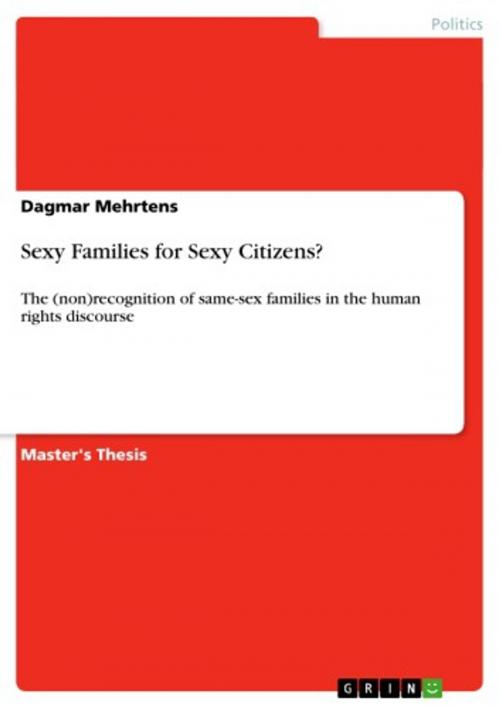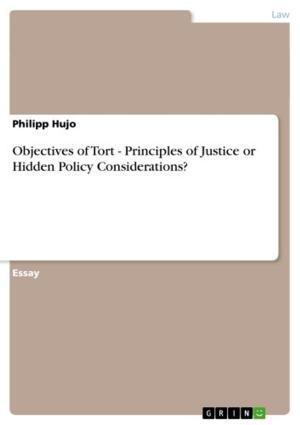Sexy Families for Sexy Citizens?
The (non)recognition of same-sex families in the human rights discourse
| Author: | Dagmar Mehrtens | ISBN: | 9783640949090 |
| Publisher: | GRIN Publishing | Publication: | July 4, 2011 |
| Imprint: | GRIN Publishing | Language: | English |
| Author: | Dagmar Mehrtens |
| ISBN: | 9783640949090 |
| Publisher: | GRIN Publishing |
| Publication: | July 4, 2011 |
| Imprint: | GRIN Publishing |
| Language: | English |
Master's Thesis from the year 2004 in the subject Politics - International Politics - Topic: Public International Law and Human Rights, grade: 9,0, University of Lisbon (Faculty of Law Ius Gentium, University of Coimbra), course: European Master's Programme in Human Rights and Democratisation, language: English, abstract: Over recent years, sexual minorities have growingly gained attention in the human rights discourse. This attention focuses on the de-criminalisation and anti-discrimination of lesbians, gays and others. However, states and human rights instruments remain unwilling to view those belonging to these newly established minorities in their complexity as social individuals and citizens. This makes it very difficult for sexual minorities to do things considered quite 'normal' and essential for others, such as living a family life and raising children. Raising the topic of same-sex families within a human rights discourse remains highly controversial. 'Family,' however, is more than a benevolent luxurious minority topic in modern welfare states. The human family constitutes the foundation of the human rights regime and as such is a fundamental cross-sectional institution and mechanism within liberal-democratic societies. Denying lesbians and gays the moral capacity of taking responsibility for partners and children, assigns them an inferior second-class status in society. Framing this distinction with categorical justifications by according them a special minority status, only supports hierarchical distinctions. It needs to be questioned, whether a specific heteronormative life-long man-wife conception of partnership can serve as the (universal) standard for marriage, family and the conception of a 'good citizen' and fully recognised member of society or whether it is not this concept of 'normality' that needs to be questioned rather than the assumed specificities of excluded 'others.'
Master's Thesis from the year 2004 in the subject Politics - International Politics - Topic: Public International Law and Human Rights, grade: 9,0, University of Lisbon (Faculty of Law Ius Gentium, University of Coimbra), course: European Master's Programme in Human Rights and Democratisation, language: English, abstract: Over recent years, sexual minorities have growingly gained attention in the human rights discourse. This attention focuses on the de-criminalisation and anti-discrimination of lesbians, gays and others. However, states and human rights instruments remain unwilling to view those belonging to these newly established minorities in their complexity as social individuals and citizens. This makes it very difficult for sexual minorities to do things considered quite 'normal' and essential for others, such as living a family life and raising children. Raising the topic of same-sex families within a human rights discourse remains highly controversial. 'Family,' however, is more than a benevolent luxurious minority topic in modern welfare states. The human family constitutes the foundation of the human rights regime and as such is a fundamental cross-sectional institution and mechanism within liberal-democratic societies. Denying lesbians and gays the moral capacity of taking responsibility for partners and children, assigns them an inferior second-class status in society. Framing this distinction with categorical justifications by according them a special minority status, only supports hierarchical distinctions. It needs to be questioned, whether a specific heteronormative life-long man-wife conception of partnership can serve as the (universal) standard for marriage, family and the conception of a 'good citizen' and fully recognised member of society or whether it is not this concept of 'normality' that needs to be questioned rather than the assumed specificities of excluded 'others.'















